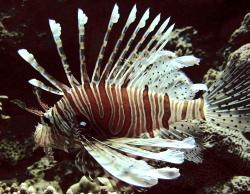Campaign Urges Lionfish Consumption
July 8, 2010 | 1 min to read

Lionfish makes for a stunning sight underwater, with its vibrant red hue and long, venomous spines. But it is also a relentless predator in U.S. and Caribbean waters, a trait that threatens coral reefs in the Southeast, Gulf of Mexico and beyond.
Sustainable-seafood advocates typically advise consumers to stay away from overfished, endangered species, but in this case they're taking the opposite tack. Federal officials have joined with chefs, spear fishermen and seafood distributors to launch a bold campaign: Eat lionfish until it no longer exists outside its native habitat.
Scientists at the National Oceanic and Atmospheric Administration theorize that the fish, a native of the western Pacific, was released from fish tanks in southern Florida sometime between the late 1980s and the early 1990s. By 2000 it had established itself off the North Carolina coast, and it has now expanded into the Caribbean and threatens to take over waters in South America and the Gulf of Mexico.
"There are some locations where lionfish have totally altered the biodiversity of a reef," said James Morris, a NOAA ecologist at the agency's Center for Coastal Fisheries and Habitat Research in Beaufort, N.C.
To read the rest of the story, please go to: The Washington Post.
